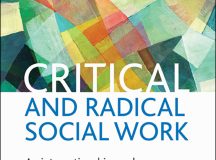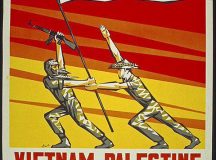In this essay, Philip Mendes argues that the new buzzword for Palestinian nationalists, ‘Progressive except for Palestine,’ aimed at progressives who do not support fundamentalist calls for the abolition of the State of Israel, is ‘not a perspective which seeks to advance principled reasonable criticism of Israel. Rather, Mendes argues the term is ‘a viewpoint based on demonising the State of Israel and all its supporters, including the many who favour a two-state solution, and limiting freedom of speech by illiberally excluding them from progressive publications and debates’.
Palestinian nationalists and their supporters increasingly use the term ‘Progressive except for Palestine (PEP)’ as a mean to discredit progressives who do not support fundamentalist calls for the abolition of the existing Jewish State of Israel and its replacement by a Greater Palestine that would almost certainly reduce Jews to at best a tolerated religious minority. According to this accusation, many progressives (particularly Jews) who are vocal in their support for social justice causes, including opposition to racism, hypocritically resort to silence when it comes to endorsing Palestinian national rights.
Gaslighting moderate progressives who defend Israel’s right to exist as part of the two-state solution and spreading antisemitic conspiracy theories
A number of recent examples show how the PEP mantra has become a new ‘buzzword’ for sections of the international Left. In July 2020, the prominent Palestinian-Australian author Abdel-Fattah alleged that multiple progressives who regularly support global struggles against ‘racism, oppression and injustice’ have failed to defend ‘the rights of Palestinians’ (Abdel-Fattah 2020). Oddly, she made this assertion despite boasting that a statement she and two other Palestinian nationalists had drafted demanding absolute justice and freedom for Palestinian Arabs irrespective of whether this outcome might result in extreme injustice for Israeli Jews (e.g. ethnic cleansing or worse) had been signed by over 700 Australian progressives (Artists & Academics Against Annexation 2020).
But notwithstanding this achievement, she claimed that many potential signatories who privately supported the sentiments refused to sign the statement due to a ‘fear’ of possible ‘material consequences’ including that they could lose their jobs and/ or experience a severe ‘backlash’ such as being ‘smeared with accusations of anti-Semitism’ (Abdel-Fattah 2020). She did not name the alleged force behind this ‘fear’, but it seems to be a reference to the alleged power and influence of pro-Israel advocacy groups who are often stereotyped by anti-Zionist conspiracy theorists as exerting global control over politics, finance and the media (Mendes 2014: 90-91).
In fact, many of these so-called ‘scared’ progressives would have been only too pleased to sign an alternative statement that defended Palestinian human and national rights, urged an end to the Israeli occupation of the West Bank so that Palestinians could exercise a right to national sovereignty alongside Israel, and recommended concrete strategies for advancing Israeli-Palestinian reconciliation via a peaceful two state solution. But, they were reluctant to sign a statement which deliberately obscured the major differences between nationalist and internationalist perspectives, and simplistically labelled one national movement as progressive and anti-racist whilst ethnically stereotyping another national group as oppressive and racist.
They may have also been uncomfortable with Abdel-Fattah’s erroneous argument that controversial Palestinian-American academic Steven Salaita lost his university position solely due to criticisms of Israeli war crimes, when, in fact, he also proudly wrote ‘I called “antisemitism” honorable’ (Salaita 2015: 9). So much for the oft-stated insistence by anti-Zionists that their demonisation of Israel has no connection to anti-Jewish racism. In short, those ‘silenced’ academics may not have wanted to be viewed as colluding with a form of PEJ, Progressive Except for Jews.
Similarly, Nick Riemer, the convenor of the Sydney University Staff for a BDS group, complained that Australian academics known for their opposition to racism and oppression were not willing to sign a letter endorsing the BDS movement’s ethnocentric proposal to boycott all Israeli academics. According to Riemer (2021), many of the non-signatories privately supported the BDS movement, but were not willing to do so publicly ‘because they were worried about the consequences’. He sarcastically speculated ‘about what the consequences they so fear might be’ or why there was such a high risk involved, implying that the Zionist movement had intimidated them into silence. Riemer failed to consider an arguably more informed interpretation: that many scholars perceive a difference between criticising Israel and demonising Israel, and are reluctant to endorse a movement that essentialises all Israeli Jews, irrespective of their diverse political views on conflict resolution with the Palestinians, as evil oppressors.
Another PEP advocate, writer Roz Bellamy, directly attacked Jews as a key cohort within progressive groups who fail to display absolute solidarity with Palestinian nationalism. She sought to establish that there can only be one legitimate progressive view on Israel-Palestine which privileges Palestinian national rights over any Israeli Jewish rights to national self-determination (Bellamy 2020). Bellamy seemed determined to advance an opportunistic rather than principled strategy intended to exclude most left-wing Jews (i.e. those who support national rights for both Israelis and Palestinians) from progressive debates.
A more detailed version of the PEP argument is presented by two American progressives Hill and Plitnick (2021). They also accuse most progressives of abandoning their belief in values such as ‘freedom and justice’ when it comes to Palestine (p.11), claiming without any specific evidence that progressives choose to be silent on Palestine in order to avoid ‘charges of bias against the world’s only Jewish state or even allegations of outright anti-Semitism’ (p.10). As with the earlier sources above, the Americans do not provide any constructive strategies for advancing a form of partial justice for the Palestinians that could be reconciled with the national rights of Israeli Jews.
Progressive Except for Jews (PEJ): A Long Tradition
The problem with PEP is not only that it applauds a zero sum version of Palestinian nationalism that eschews any possibility of compromise with Israeli nationalism. Additionally, it arguably constitutes the latest chapter in the long history of progressives being ‘progressive except for Jews, or PEJ. The left has been selectively ignoring manifestations of Jewish oppression dating back to the Russian pogroms of the late 19th century. For example, the Russian Jewish revolutionary Paul Axelrod was dissuaded by colleagues from publishing a pamphlet condemning the infamous 1881 pogroms in the Ukraine on the grounds that it would alienate the revolutionaries from the Russian peasants (Mendes 2014: 41). Similarly, an 1891 meeting of the Socialist Internationale refused to endorse a specific motion condemning anti-Semitism. Instead, the body condemned manifestations of both anti-Semitism and philo-Semitism as means by which capitalists sought to divert the socialist movement and divide the working class (Mendes 2014: 47).
Later, the Comintern reversed its initial position attacking the 1929 Arab riots against Jewish civilians in Palestine as a pogrom. Instead, the riots were reconfigured as a revolutionary attack on British and Zionist imperialism, and enormous pressure was placed on Jewish communists worldwide to endorse this apology for anti-Jewish massacres (Mendes 2014: 101). Similarly, Communists including particularly Jewish Communists were compelled in the early 1950s to endorse the infamous Stalinist anti-Jewish purges known as the Slansky Trial and the Doctors Plot, and to deny that any anti-Semitism was involved (Mendes 2014: 77).
An equally reprehensible practice has been the pressure placed by some Left groups on their Jewish members to provide a moral alibi for anti-Semitic demonisers of Israel by arguing that Jews also share their views (Mendes and Dyrenfurth 2015: 77-78). The British radical Left activist Steve Cohen (2005) parodied this practice, exclaiming:
Every Jew on the Left will know that terrible syndrome whereby, whatever the context and wherever one is, we will be tested by being given the question what is your position on Zionism? Wanna support the miners – what’s your position on Zionism? Against the bomb – what’s your position on Zionism? And we all know what answer is expected in order to pass the test. It is a very strong form of anti-Semitism based on assumptions of collective responsibility. Denounce Zionism, crawl in the gutter, wear a yellow star and we’ll let you in the club.
Conclusion
The ’PEP’ jibe is not a universalist voice in opposition to racism and oppression. If it was, its supporters (particularly those of Arab origin) would be active in documenting the appalling persecution and mass ethnic cleansing of Jews from the Arab world in the lead up to and following the creation of the State of Israel. Yet, when Jews around the world commemorated the 80th anniversary of the infamous farhud of 1941, the pogrom that killed at least 180 Jews in Baghdad (Mendes 2021), the PEP supporters were absolutely silent.
‘PEP’ is also not a perspective which seeks to advance principled reasonable criticism of Israel, for example, to end the military occupation of Palestinian territories in the West Bank, to cease building or expanding settlements in the West Bank, or to halt security measures which harm the human rights of Palestinians within the West Bank and Gaza Strip. To the contrary, ‘PEP’ is a viewpoint based on demonising the State of Israel and all its supporters, including the many who favour a two-state solution, and limiting freedom of speech by illiberally excluding them from progressive publications and debates.
References
Abdel-Fattah, Randa (2020) ‘The Great Palestinian Silence’, Meanjin, 10 July: https://meanjin.com.au/blog/the-great-palestinian-silence/
Artists & Academics Against Annexation (2020) Statement, access link via https://meanjin.com.au/blog/the-great-palestinian-silence/
Bellamy, Roz (2020) ‘Why we cannot be progressive except for Palestine’, Overland, 20 July: https://overland.org.au/2020/07/why-we-cannot-be-progressive-except-for-palestine/
Cohen, Steve (2005) ‘There must be some way out of here’, www.you-don’t-look-anti-semitic.blogspot.com.
Hayes, Kathleen (2021) ‘Antisemitism and the Left: A memoir’, Fathom, July: https://fathomjournal.org/antisemitism-and-the-left-a-memoir/
Hill, Marc Lamont and Plitnick, Mitchell (2021) Except for Palestine: The limits of progressive politics. The New Press. New York. https://thenewpress.com/books/except-for-palestine
Mendes, Philip (2014) Jews and the Left: The rise and fall of a political alliance. Palgrave MacMillan. Houndmills. https://www.palgrave.com/gp/book/9781137008299#aboutBook
Mendes, Philip (2021) ‘Remembering the Farhud: Iraq’s version of Kristallnacht’, Plus 61J Media: https://plus61j.net.au/jewish-world/remembering-the-farhud-iraqs-version-of-kristallnacht/
Mendes, Philip and Dyrenfurth, Nick (2015) Boycotting Israel is wrong: The progressive path to peace between Palestinians and Israelis. New South Publishing. Sydney.
Riemer, Nick (2021) ‘Universities and Palestine: Three kinds of silence’, Arena Online, 8 April: https://arena.org.au/universities-and-palestine-three-kinds-of-silence/
Salaita, Steven (2015) Uncivil rites: Palestine and the limits of academic freedom. Haymarket Books. Chicago.






































“Progressive” is a buzz word for antisemitic anti-Zionism.